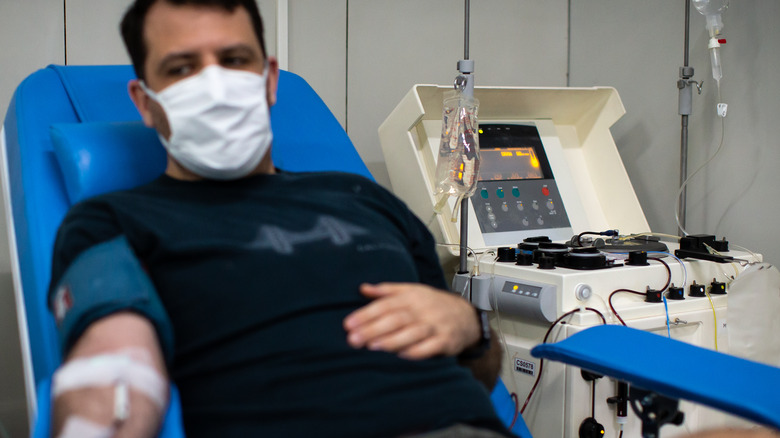Why You Should Think Twice Before Trying The 'Blood Washing' Treatment For Long COVID
Long COVID occurs when a person experiences long-term effects from having COVID-19. The Centers for Disease Control and Prevention (CDC) estimates that about 13.3% of those with long COVID were infected for a month or longer, and 2.5% experienced symptoms for three months or longer. In addition, more than 30% of those hospitalized with the infection had symptoms for six months. Long COVID is not completely understood, and symptoms can vary. In fact, some patients experience ongoing health problems that can last for years (via CDC).
Experts do not know what causes long COVID in certain people, but 2021 research published in the Journal of Thrombosis and Haemostasis suggests that it may be the result of blood clotting problems. These issues might account for some symptoms of long COVID, including fatigue and a drop in overall fitness. In fact, the small 2021 study of 50 people showed that people who had high levels of blood clotting markers experienced more long COVID symptoms (via Healthline). To deal with long COVID, some patients are going to extreme measures, including a treatment called blood washing, otherwise known as apheresis.
Blood washing removes lipids and inflammatory proteins from blood
Apheresis is an expensive process that filters and removes lipids and inflammatory proteins in the blood. The idea behind apheresis for long COVID is that it makes blood less sticky while improving blood circulation in the smallest of blood vessels. For those suffering from long COVID, apheresis is paired with anticoagulation drugs, which reduce the number of blood clots that form in the blood (via the British Medical Journal).
While apheresis is considered generally safe (via MedicalNewsToday), the jury is still out on whether it is effective for long COVID, and some experts consider the procedure experimental. "[T]here is quite a lot we don't know about the effectiveness of it, and indeed also about the risks, the complications, the side effects with patients who have long covid, as opposed to patients who may have cardiovascular issues," medical ethicist and advocate Daniel Sokol told the British Medical Journal (BMJ).
Robert Ariens, professor of vascular biology at the University of Leeds School of Medicine, also told the publication that offering apheresis with anticoagulation therapy is premature since doctors don't know what is causing the clots. He added that there is also the issue of increased bleeding in patients on these kinds of therapies. Perhaps more importantly, he explained that there is no scientific or peer-reviewed evidence suggesting these methods work (via the BMJ).


